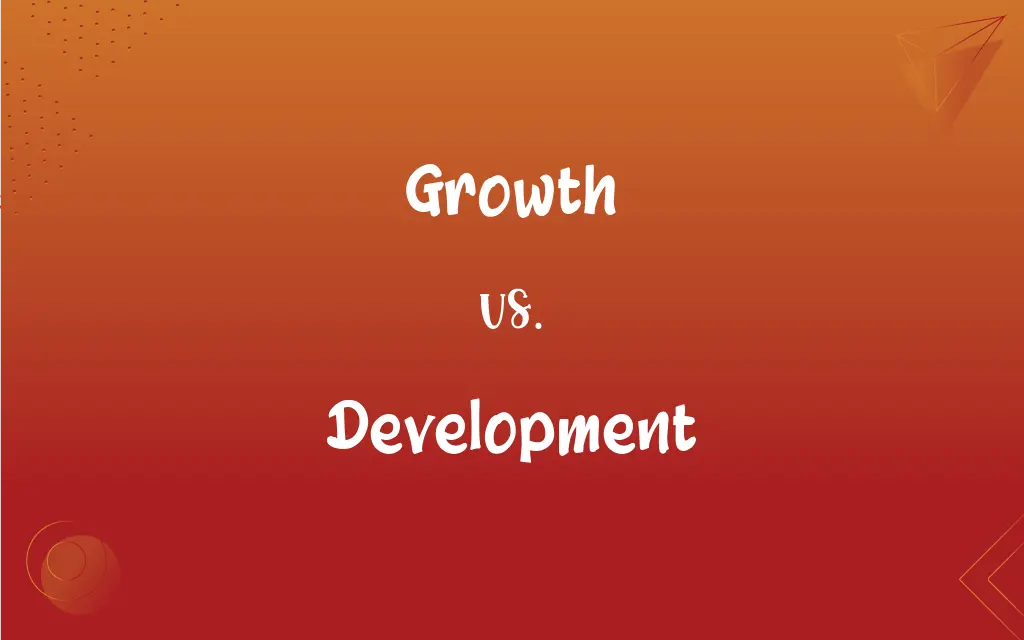Growth vs. Development: What's the Difference?
Edited by Aimie Carlson || By Harlon Moss || Updated on October 19, 2023
Growth refers to an increase in size or number, while development entails qualitative changes or progress.

Key Differences
Growth and development, although often used interchangeably, represent distinct concepts. Growth specifically refers to the increase in size, quantity, or volume of an entity, whereas development emphasizes the progress or improvement in abilities, qualities, or complexity.
Growth is typically quantifiable and can be measured in concrete terms like height, weight, or revenue. Development, on the other hand, denotes a progression from a simpler to a more advanced state, often requiring subjective assessment or evaluation.
When considering human life, growth is evident in physical changes such as getting taller or gaining weight. Development encompasses aspects like emotional maturity, cognitive abilities, or skills acquisition. Both are essential for an individual’s overall well-being and progression.
Plants provide a clear illustration of the dichotomy between growth and development. Growth can be seen as the plant gets taller or spreads wider, while development might refer to its transition from a seedling to a mature plant or its ability to flower and produce fruit.
In the business context, growth often indicates expanding operations, increasing revenue, or acquiring more customers. Development could refer to the enhancement of products, improvement in services, or the evolution of organizational culture and practices.
ADVERTISEMENT
Comparison Chart
Nature
Quantitative
Qualitative
Measurement
Can be measured directly (e.g., height, weight)
Often subjective (e.g., skills, maturity)
Time frame
Can be short-term
Typically long-term or continuous
Outcome
Increase in size or number
Improvement in quality or complexity
Example in human context
Taller stature, weight gain
Acquiring a new skill, emotional maturity
ADVERTISEMENT
Growth and Development Definitions
Growth
An increase in size.
The growth of the tree over the years was remarkable.
Development
The act of improving by expanding or refining.
The development of his skills was evident after years of practice.
Growth
A stage of increasing development or maturity.
He experienced a growth spurt during his teenage years.
Development
A significant event, occurrence, or change.
The sudden development in the case left everyone in shock.
Growth
The process of becoming larger.
The city's rapid growth surprised everyone.
Development
The process of constructing or creating something.
The development of the new shopping mall took two years.
Growth
The rise in economic value or business activity.
The company witnessed a 10% growth in revenue.
Development
Progression from a simpler to a more advanced state.
Her emotional development during therapy was commendable.
Growth
A new or abnormal formation, like a tumor.
The doctor was concerned about the growth on his skin.
Development
An area with newly constructed structures.
They bought a house in a new development.
Growth
The process of growing.
Development
The application of techniques or technology to the production of new goods or services.
Growth
Full development; maturity.
Development
The business of constructing buildings or otherwise altering land for new uses.
FAQs
How is development different from growth?
Development entails qualitative changes or progress, rather than just increase in size or number.
Can growth be easily measured?
Yes, growth is typically quantifiable, like in terms of height, weight, or revenue.
Is development always tangible?
No, development can often be intangible, involving subjective assessments of progress or improvement.
Is emotional maturity a sign of growth or development?
Emotional maturity is a sign of development.
Does growth always mean positive change?
Not necessarily. For instance, the growth of a tumor is not a positive change.
What does growth primarily refer to?
Growth primarily refers to an increase in size or number.
Is growth always visible?
Not always. Some forms of growth, like intellectual growth, may not be immediately visible.
Which is typically more long-term: growth or development?
Development is often long-term or continuous, while growth can be short-term.
Is development always beneficial?
Generally, development is seen as positive, but it depends on the context. Some developments might not always be beneficial.
Can growth be halted?
Yes, growth can plateau or halt due to various reasons depending on the context.
Is development a continuous process?
Often, development is viewed as a continuous or long-term process, but there can be stages or milestones.
Can development be reversed?
In some contexts, development can regress or be undone, though not always.
Can a business experience both growth and development simultaneously?
Yes, a business can grow in terms of revenue or size while also developing its products, services, or culture.
Are growth and development interdependent?
Not always, but they can influence each other, especially in contexts like human life or business.
In what context is development often used?
Development is frequently used in contexts of skill acquisition, product enhancement, and organizational progress.
What might indicate growth in a business?
Indicators might include increased revenue, more employees, or expanded operations.
What's a physical sign of growth in humans?
Physical signs include getting taller, gaining weight, or muscle development.
Which is broader in scope: growth or development?
Development is generally broader as it encompasses qualitative changes in addition to quantitative ones.
Can growth be negative?
In certain contexts, like economics, "negative growth" refers to a decrease or contraction.
How can one assess development in an individual?
Through evaluation of skills, emotional maturity, cognitive abilities, and other qualitative changes.
About Author
Written by
Harlon MossHarlon is a seasoned quality moderator and accomplished content writer for Difference Wiki. An alumnus of the prestigious University of California, he earned his degree in Computer Science. Leveraging his academic background, Harlon brings a meticulous and informed perspective to his work, ensuring content accuracy and excellence.
Edited by
Aimie CarlsonAimie Carlson, holding a master's degree in English literature, is a fervent English language enthusiast. She lends her writing talents to Difference Wiki, a prominent website that specializes in comparisons, offering readers insightful analyses that both captivate and inform.































































